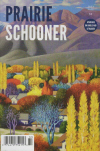Prairie Schooner – Fall 2013
The cover of this issue of Prairie Schooner greets the reader with an impressionist autumn scene painted by Faridun Zoda. The inviting image is appropriate; the editors have chosen work that compels the reader to take a step back and enjoy a moment of quiet contemplation.
The cover of this issue of Prairie Schooner greets the reader with an impressionist autumn scene painted by Faridun Zoda. The inviting image is appropriate; the editors have chosen work that compels the reader to take a step back and enjoy a moment of quiet contemplation.
Christopher Citro’s poem “Creation Myth” includes a number of powerful images. The narrator begins by describing a rural scene: “Overgrown weeds had hidden the car until / the brushfire revealed it. Once the doors cooled, / neighborhood kids came to investigate . . .” The car is occupied by a man and woman in formalwear. Those children receive a potent lesson in a few different kinds of “creation.” Citro’s poem distinguishes itself with the strength of the imagery and the interesting way in which Citro allows the reader to slide into the perspective of Timmy, one of the children whose understanding of the world is being changed by what he sees.
Zdravka Evtimova offers us an odd kind of biography in her short story, “Laura.” The title character buys and sells brandy, dealing with a wide range of people along the way. Laura knows that both men and brandy can vary wildly in quality. Yani? Laura gives him “the best of her amber treasure,” the finest liquor in her inventory. Laura, in her world but not of it, begins and ends this story in the same manner. She gives people what they need and makes a healthy profit. Evtimova, a Bulgarian writer, fills her story with enjoyable sentences reflected through an Eastern European prism. Laura, we are reminded, is the “other,” but is very much a woman at heart.
Essayist Barry Lopez informs his reader about the “Six Thousand Lessons” he learned during his many world travels. At the age of three, he left Mamaroneck, New York and has been nearly everywhere from Bankok to Nairobi and Perth and “into the country beyond” the cities. Lopez’s anecdotes add up to the overall truth the author had in mind: ”diversity is not, as I had once thought, a characteristic of life. It is, instead, a condition necessary for life. To eliminate diversity would be like eliminating carbon and expecting life to go on.” Mr. Lopez’s essay may be too abstract to be of use to human resources personnel, but it cuts to deeper and more meaningful truths.
I’m a sucker for poetry about historical figures and situations. Margaret Randall definitely got my attention with her poem, “About Little Charlie Lindbergh.” That case is an interesting one; the American media had developed it to the point that the Lindbergh’s pain could be shared by the entire country. Randall ties that public pain to a private one:
A year before I was born, Mother
gave birth to her first daughter,
named Margaret
and dead within hours.
I too am Margaret.
Randall puts her finger on the lesson many of us never learned from the Lindbergh kidnapping, the O.J. Simpson trial, or from Mommie Dearest: celebrity families are like every other, warts and all.
As always, this issue of Prairie Schooner—a publication created in Lincoln, Nebraska—offers a glimpse into the lives of people from across the globe. The journal glorifies what may be the most important truth of humanity: literature eliminates all of the barriers between us.
[prairieschooner.unl.edu]





